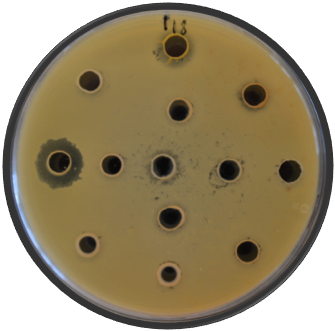Understanding the dynamics of viral infections in multispecies biofilms
Project type: Master
 Have you ever gotten sick from a virus? Or even experienced getting infected by the causative agent of COVID-19, SARS-CoV-2? During a viral infection, we rely on our immune response to detect and eliminate the virus. The same applies for bacteria. Viruses that specifically infect bacteria are called bacteriophages. If a bacteriophage successfully infects a host, the outcome is often lethal for the bacterium. Interestingly, phages are the most abundant biological entity on earth. By infecting bacteria, they have an immense impact on ecology and evolution. Moreover, due to their lytic capabilities, phages also have clinical relevance as agents for treatment of bacterial infections. With an increasing number of pathogens developing antibiotic resistance, it is critical to research potential new ways to treat infections; studying phages could pave the way for the development of alternative treatments.
Have you ever gotten sick from a virus? Or even experienced getting infected by the causative agent of COVID-19, SARS-CoV-2? During a viral infection, we rely on our immune response to detect and eliminate the virus. The same applies for bacteria. Viruses that specifically infect bacteria are called bacteriophages. If a bacteriophage successfully infects a host, the outcome is often lethal for the bacterium. Interestingly, phages are the most abundant biological entity on earth. By infecting bacteria, they have an immense impact on ecology and evolution. Moreover, due to their lytic capabilities, phages also have clinical relevance as agents for treatment of bacterial infections. With an increasing number of pathogens developing antibiotic resistance, it is critical to research potential new ways to treat infections; studying phages could pave the way for the development of alternative treatments.
To fully understand the biology and application of phages, we need to examine the eco-evolutionary dynamics of bacteria-virus encounters. Most bacteria live in so-called biofilms, which are communities embedded in an extracellular matrix that facilitate several emergent properties. In this project, we will investigate what happens when bacterial biofilms are exposed to different phages, and whether those dynamics differ when a biofilm consists of more than one bacterial species. Specifically, you will be working with a three-species community of fluorescently tagged bacteria and an associated catalogue of phages. To elucidate the interactions between bacteria and phages, you will apply a range of techniques such as whole-genome-sequencing, bioinformatic analyses, metabolic profiling, confocal laser scanning microscopy (CLSM), and advanced image analysis. You will learn to construct plasmids, manipulate the chromosome of bacteria, grow biofilms, work with different bacteria and phages, and operate the CLSM.
The project will be conducted at Section for Microbiology at Nørre Campus in Copenhagen. We have a diverse lab environment with researchers focusing on various aspects of microbiology, a high level of interproject interactions and a penchant for being social after a period with too few gatherings. You will have a day-to-day supervisor in the lab that will assist you with practical and scientific tasks and ensure your smooth transition into the group.
The project is flexible and will be well-suited for a microbiology or biochemistry student with an interest in molecular microbiology. Do not hesitate to contact us for more information and feel free to come by and have a chat about how to shape the project to match your interests.
Contact information:
Supervisor Associate professor Mette Burmølle, LINK TO PROFILE
E-mail: burmolle@bio.ku.dk
Address
Section of Microbiology
Universitetsparken 15, building 1, 1st floor
DK-2100 Copenhagen
Section of Microbiology

Contact
Section of Microbiology
Universitetsparken 15, build. 1, 1. floor
DK-2100 Copenhagen
 SUPERVISOR
SUPERVISOR
Professor Mette Burmølle
E-mail: burmolle@bio.ku.dk
